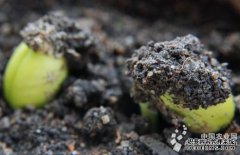Yucheng vegetable waste "turn waste into treasure" vegetable industry to achieve green development
[introduction to China vegetable Network] Tenebrio Molitor can eat all kinds of vegetable waste, and tail vegetables are their favorite food. The treatment of tail vegetables by transabdominal transformation of Tenebrio Molitor is a process of biological transformation which converts low-value tail vegetables into high value-added insect protein with significant economic benefits.
Recently, the reporter followed the staff of Yucheng vegetable Bureau into the Yang's insect breeding base in Fangsi Town. There were layers of paper trays on the rows of iron shelves, and the staff pulled out the paper trays. A layer of wheat bran was full of bugs, wriggling one by one. The staff put in some chopped vegetable leaves, and the bugs immediately ate them. This is the only city-level insect breeding cooperatives in Dezhou to invest in the construction of Tenebrio Molitor breeding plant.
According to the person in charge of the base, this kind of vegetable-eating insect is called Tenebrio Molitor, commonly known as bread worm. It is an environmental insect with wide feeding habits, strong environmental adaptability, and high reproductive ability, and its excretion is a very important organic fertilizer and a feed with high nutritional value. In addition, Tenebrio Molitor can eat all kinds of vegetable waste, and tail vegetables are their favorite food. The treatment of tail vegetables by transabdominal transformation of Tenebrio Molitor is a process of biological transformation which converts low-value tail vegetables into high value-added insect protein with significant economic benefits. At present, the base can handle 1200 jin of tail food every day, with a monthly output of 3 tons of dry products and a monthly profit of more than 20,000 yuan. It can be said that it has not only solved the problem of the management of tail vegetables, but also realized the "turning waste into treasure".
In recent years, with the rapid development of vegetable industry, the high yield of vegetables has also brought the problem that tail vegetables are increasingly difficult to digest. A large number of leaves, roots, stems and fruits produced during the processing of a large number of residual vegetables and vegetables have become new sources of environmental pollution in rural areas. In order to comprehensively control the pollution of tail vegetables, Yucheng City insists on actively exploring the production mode of "comprehensive application and ecological cycle" while grasping vegetable production. At present, in addition to turning waste into treasure by raising insects in tail vegetables, edible fungi in Yucheng have formed a virtuous ecological cycle of "xylose residue-edible fungi-waste residue to produce organic fertilizer". Aolong vegetable Park is promoting the ecological cycle model of "xylose dregs producing organic fertilizer-organic fertilizer producing organic vegetables". These ecological cycle management models minimize the environmental pollution caused by vegetable production. Social benefits exceed economic benefits, promoting the city's vegetable industry to achieve a green, healthy and harmonious development.
- Prev

Comments on the important issues of genetically modified genes in China in 2015
2015, at the end of the year, the agricultural industry is celebrating a bumper harvest and showing the future. Pick up media reports on the top 10 important issues of GM in China for comments; perhaps these developments will be carried into 2016 to continue to ferment. I. document No. 1 of the Central Committee instructs the Central Committee for the Popularization of genetically modified Science
- Next

The New seed Law of Guazhou County in Jiuquan strengthens the function of seed Supervision (Picture
In order to publicize the great significance of the promulgation of the new seed Law, improve the level of administration according to law, enhance the law-abiding awareness of crop seed producers and operators, and do a good job in seed production, operation and management in the county. On January 6, the county seed management station organized the person in charge of seed enterprises in the area and
Related
- A one-day flower show brings 130 million yuan in orders! Nanhai, this Phalaenopsis exhibition is amazing
- What do the flower language and meaning of Lutheran tree mean? Precautions for planting Lutheran tree
- Encounter Chaoshan Kongfu tea, not without this cup of Phoenix single clump
- The durian market in Vietnam and Thailand is flooded. The price of imported durian has plummeted by 30-40% in a month.
- Shanghai solved the problem of local vegetable supply by planting 80,000 mu of green leafy vegetables.
- Wageningen University has become the best agricultural university in the world for the seventh time in a row.
- The strongest export season of South African grapes is full of challenges, with exports to Russia falling sharply by 21%.
- Sri Lanka is on the verge of bankruptcy, "Tea for debt" Organic Agriculture Revolution aggravates the Food crisis?
- Turning waste into earthworm manure and worm manure into organic fertilizer-A new choice for auxiliary farming
- Organic rice growers shoulder the responsibility of nurturing agricultural talents! Yinchuan Sustainable Farm with Organic Life Camp

